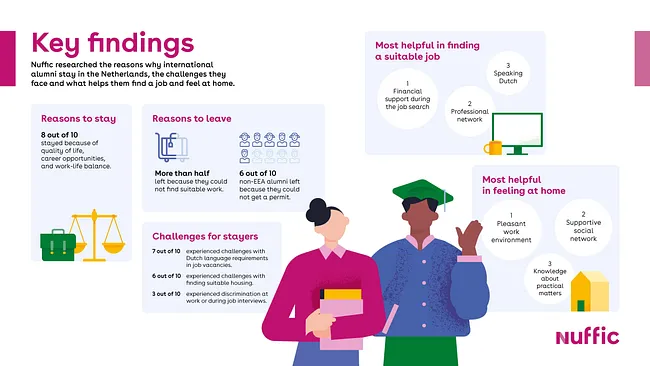Our team would be happy to share their expertise to help you get the answers you are looking for. Feel free to contact us about your situation and any questions you may have.
We look forward to hearing from you!
Curious what this means for you? Find out more about international stay rates and their impact on the workforce.
A growing number of international students are choosing to stay in the Netherlands after completing their studies, according to a recent study by Nuffic. This research focused on what is known as the "stay rate"—the percentage of international graduates who remain in the Netherlands after completing their studies—shows an upward trend. This is welcome news for employers, policymakers, and of course, the international students themselves.
The researchers have been tracking the trends since 2013 and the growth is clear, especially in recent years. More than 25% of international graduates hit the 5 year mark of living in the Netherlands after graduating nowadays, which is up from the 24.1% recorded in the previous report from 2022. For the most recent cohort with available data (students who graduated in 2023), a remarkable 57% were still in the country one year after graduation, compared to a mere 40% for the 2018 cohort. This means more recent graduates are increasingly likely to stay, with expectations that the five-year stay rate will also continue to rise.
At Undutchables, this aligns with what we see in the job market: international talent is not only seeking opportunities in the Netherlands—they’re choosing to build their lives here. The market is encouraging for internationals and the numbers are bringing that even more to light.
Not all international graduates follow the same path. Several factors increase the likelihood of staying:
The stay rate also tends to vary by city. Students who study in an institution in Eindhoven are leading the pack in stay rate with nearly 49% of international graduates still in the Netherlands after five years, with Delft and Utrecht following close behind at 39% and 37% respectively. Ironically, Maastricht is a highly sought after study destination but appears sees the lowest stay rate (12%), although many graduates do stick around the area but relocate just across the borders to Belgium or Germany.
Ultimately, the Amsterdam region appears to be the top destination for those who stay in the Netherlands after graduation, with around 37% of international graduates working in or near the capital. The Rotterdam and The Hague regions also attract significant numbers of graduates, followed by Eindhoven. Thanks to the international job opportunities in these areas it is not a surprise to see the Randstad high on the list, but is also nice to note that Brabant is making its way up there providing more jobs and international communities throughout the country.
International graduates are highly educated, globally minded, and driven individuals. Of the international graduates who stay at least five years at least 80% are employed. Not only that, but the typical salary rate for these individuals is not bad either.
Their decision to remain in the Netherlands brings long-term benefits to the Dutch economy, especially in a tight labor market that is seeking continual growth and innovation. growing shortages of skilled professionals. This increase of specialized skills and international experience helps companies to grow and stay relevant in the global market.
For international-focused recruitment agencies like Undutchables, these findings confirm a key trend: international graduates are not just passing through—they are building careers and contributing to the Dutch workforce. With the right support, such as career coaching, relocation guidance, and inclusive workplaces, employers can tap into this growing pool of talent.
Whether you’re hiring for tech, logistics, education, finance, or customer service roles, international graduates bring valuable skills, multicultural perspectives, and long-term commitment that can help your company grow, not only locally, but also internationally.
This study was researched and published by Nuffic. You can find their dashboard with more insights and links here or click here for the full study report.
Looking to hire multilinguals, or have any questions about working with recent international graduates? Reach out to our team and we will be happy to help you further.
Our team would be happy to share their expertise to help you get the answers you are looking for. Feel free to contact us about your situation and any questions you may have.
We look forward to hearing from you!
Would you like to receive our Undutchables Newsletter? In this newsletter we will give you guidance on working in the Netherlands and working with internationals, let you know about upcoming events and share interesting articles. And do you wish to stay up to date about our latest vacancies? Subscribe now to our job alert and you will receive the newest vacancies straight into your inbox.

We only need a few personal details, thanks!

